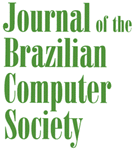Resumo em Inglês:
Objects and agents are software engineering abstractions that have many common concerns. However, agents are more complex entities since they encompass additional concerns: their state is driven by beliefs, goals, capabilities and plans, and their behavior is composed of a number of agency properties such as autonomy, adaptation, interaction, learning, mobility, and collaboration. A multi-agent system usually incorporates multiple objects and types of agents, with each agent type addressing distinct agency concerns. These agency concerns typically overlap and interact with each other, and so a disciplined scheme for composition is required. In this context, this paper presents and compares an aspect-based proposal with a new pattern-based proposal for building multi-agent software. Both proposals have the following goals: (i) minimize the misalignments between high-level agent models and object-oriented designs, (ii) promote the separation of agency concerns, (in) provide explicit support for disciplined composition of agency concerns in complex software agents, (iv) incorporate flexible facilities to build different types of software agents, and (v) allow the production of multi-agent software systems that are easy to understand, maintain and reuse. We demonstrate the applicability of the two proposals through the Portalware system, a Web-based environment f or the development of e-commerce portals.
